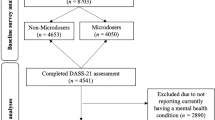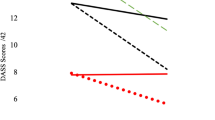Abstract
Background
GLP-1 receptor agonists (GLP-1 RAs) have dramatically altered obesity treatment. Media reports suggest that GLP-1 RAs users often report feeling judged for taking a “shortcut” to lose weight, which may be related to negative stereotypes toward people with larger bodies. Media reports also describe negative attitudes about lean people who take GLP-1 RAs to enhance their appearance. The present research used a 2 × 2 experimental design to test the effects of GLP-1 RA use and body size on attitudes and egocentric impressions.
Subjects/Methods
A sample of 357 U.S. adults (Mage = 37.8, SD = 13) were randomly assigned to read about a woman, who either was lean or had obesity, and who lost 15% of her body weight either with diet/exercise or a GLP-1 RA. Participants answered questions measuring endorsement of negative weight-related stereotypes and egocentric attitudes toward the woman, as well as beliefs that she took a shortcut to lose weight and beliefs that biogenetic factors caused her baseline weight.
Results
Negative evaluations and egocentric impressions were stronger toward a woman who lost weight with a GLP-1 RA compared to diet/exercise. Losing weight with a GLP-1 RA led to stronger negative evaluations through higher weight loss shortcut beliefs irrespective of body size. Losing weight with a GLP-1 RA also led to higher egocentric impressions through higher shortcut beliefs, and this effect was stronger for a lean woman. Finally, losing weight with a GLP-1 RA led to more negative evaluations through stronger endorsement of biogenetic causal beliefs for a lean woman only.
Conclusions
This timely study provides evidence that people with larger and smaller bodies alike are at-risk for being judged for using GLP-1 RAs due to beliefs that these medications are a shortcut. Findings also demonstrate novel reactions related to egotism when weight loss is achieved with pharmacological interventions.
Pre-registration and data
osf.io/xme4w.
This is a preview of subscription content, access via your institution
Access options
Subscribe to this journal
Receive 12 print issues and online access
$259.00 per year
only $21.58 per issue
Buy this article
- Purchase on Springer Link
- Instant access to full article PDF
Prices may be subject to local taxes which are calculated during checkout



Similar content being viewed by others
Data availability
Full measures, code, and data analyzed for the present study can be found online at osf.io/xme4w.
Notes
The pre-registered study tested a fifth condition in which the woman with obesity lost weight with bariatric surgery. We excluded this condition from the present manuscript because our primary research aim was to compare differences in negative evaluations and egocentric impressions between GLP-1 RA and diet/exercise; however, mean comparisons with the bariatric surgery condition are included in supplemental materials.
References
Prillaman M. The ‘breakthrough’ obesity drugs that have stunned researchers. Nature. 2023;613:16–8.
Bernstein E. On Ozempic, and feeling judged for taking the “easy way out”. The Wall Street Journal. 2023. https://www.wsj.com/articles/ozempic-weight-loss-drugs-strains-relationships-327ab217.
Kolata G. New obesity drugs come with a side effect of shaming. The New York Times. 2023. https://www.nytimes.com/2023/06/14/health/obesity-drugs-wegovy-ozempic.html.
Thompson D. The weight-loss-drug revolution is a miracle—and a menace. The Atlantic. 2023. https://www.theatlantic.com/newsletters/archive/2023/01/the-weight-loss-drug-revolution-is-a-miracle-and-a-menace/672861/.
Nogrady B. “Hollywood skinny jab”: what do we know about anti-obesity drugs such as Ozempic in Australia? The Guardian. 2023. https://www.theguardian.com/society/2023/apr/08/theres-a-real-bias-what-do-we-know-about-anti-obesity-drugs-in-australia.
Prunty A, Clark MK, Hahn A, Edmonds S, O’Shea A. Enacted weight stigma and weight self stigma prevalence among 3821 adults. Obes Res Clin Pract. 2020;14:421–7.
Brochu PM, Esses VM. What’s in a name? The effects of the labels “Fat” versus “Overweight” on weight bias1. J Appl Soc Psychol. 2011;41:1981–2008.
Wu Y, Berry DC. Impact of weight stigma on physiological and psychological health outcomes for overweight and obese adults: a systematic review. J Adv Nurs. 2018;74:1030–42.
Hoyt CL, Burnette JL, Auster-Gussman L, Blodorn A, Major B. The obesity stigma asymmetry model: the indirect and divergent effects of blame and changeability beliefs on antifat prejudice. Stigma Health. 2017;2:53–65.
Crandall CS. Prejudice against fat people: ideology and self-interest. J Personal Soc Psychol. 1994;66:882–94.
Martingano AJ, Telaak SH, Schopp EM, Fortney C, Dolwick AP, Carnell S, et al. Using educational videos and perspective-taking to communicate gene-by-environment interaction concepts about eating behavior: effects on empathy and weight stigma. J Nutr Educ Behav. 2023;55:55–67.
Persky S, Eccleston CP. Impact of genetic causal information on medical students’ clinical encounters with an obese virtual patient: health promotion and social stigma. Ann Behav Med. 2011;41:363–72.
Columbia University Irving Medical Center. Popularity of weight loss drugs soars, but weight stigma persists. 2023. https://www.cuimc.columbia.edu/news/popularity-weight-loss-drugs-soars-weight-stigma-persists.
Xing S, Sharp LK, Touchette DR. Weight loss drugs and lifestyle modification: perceptions among a diverse adult sample. Patient Educ Couns. 2017;100:592–7.
Fardouly J, Vartanian LR. Changes in weight bias following weight loss: the impact of weight-loss method. Int J Obes. 2012;36:314–9.
Mattingly BA, Stambush MA, Hill AE. Shedding the pounds but not the stigma: negative attributions as a function of a target’s method of weight loss. J Appl Biobehav Res. 2009;14:128–44.
Vartanian LR, Fardouly J. The stigma of obesity surgery: negative evaluations based on weight loss history. Obes Surg. 2013;23:1545–50.
Tchang BG, Aras M, Kumar RB, Aronne LJ. Pharmacologic treatment of overweight and obesity in adults. In: Feingold KR, Anawalt B, Blackman MR, Boyce A, Chrousos G, Corpas E, et al., editors. Endotext. South Dartmouth (MA): MDText.com, Inc.; 2000. http://www.ncbi.nlm.nih.gov/books/NBK279038/.
Tolentino J. Will the Ozempic era change how we think about being fat and being thin? The New Yorker. 2023. https://www.newyorker.com/magazine/2023/03/27/will-the-ozempic-era-change-how-we-think-about-being-fat-and-being-thin.
Valdesolo F. What you need to know about Ozempic: the diabetes drug fueling Hollywood’s harmful weight-loss obsession. Vogue. 2023. https://www.vogue.com/article/what-is-ozempic-hollywood-weight-loss-drug.
Kolata G. The doctor prescribed an obesity drug. Her insurer called it ‘Vanity.’ The New York Times. 2022. https://www.nytimes.com/2022/05/31/health/obesity-drugs-insurance.html.
Cha A. Their child’s obesity drug was working. Then their plan refused to pay. The Washington Post. 2023. https://www.washingtonpost.com/health/2023/03/26/ozempic-insurance-coverage-children/.
Bonell S, Barlow FK, Griffiths S. The cosmetic surgery paradox: toward a contemporary understanding of cosmetic surgery popularisation and attitudes. Body Image. 2021;38:230–40.
American Psychological Association. APA dictionary of psychology: egocentrism. American Psychological Association; 2023. https://dictionary.apa.org/egocentrism.
Elboim-Gabyzon M, Attar K, Peleg S. Weight stigmatization among physical therapy students and registered physical therapists. Obes Facts. 2020;13:104–16.
Flint SW, Hudson J, Lavallee D. UK adults’ implicit and explicit attitudes towards obesity: a cross-sectional study. BMC Obes. 2015;2:31.
Puhl RM, Latner JD, O’Brien K, Luedicke J, Danielsdottir S, Forhan M. A multinational examination of weight bias: predictors of anti-fat attitudes across four countries. Int J Obes. 2015;39:1166–73.
Cobanoglu C, Cavusoglu M, Turktarhan G. A beginner’s guide and best practices for using crowdsourcing platforms for survey research: the case of Amazon Mechanical Turk (MTurk). JGBI. 2021;6:92–7.
Pearl RL, Lebowitz MS. Beyond personal responsibility: effects of causal attributions for overweight and obesity on weight-related beliefs, stigma, and policy support. Psychol Health. 2014;29:1176–91.
Bacon J, Scheltema K, Robinson B. Fat phobia scale revisited: the short form. Int J Obes. 2001;25:252–7.
Cohen J. Statistical power analysis for the behavioral sciences. 2nd ed. Hillsdale, NJ: Lawrence Earlbaum Associates; 1988.
Hayes AF. Introduction to mediation, moderation, and conditional process analysis: a regression-based approach. New York: Guilford; 2017.
Puhl RM, Liu S. A national survey of public views about the classification of obesity as a disease. Obesity 2015;23:1288–95.
Aronson E, Mills J. The effect of severity of initiation on liking for a group. J Abnorm Soc Psychol. 1959;59:177–81.
Festinger L. A theory of cognitive dissonance. Stanford: Stanford University Press; 1957.
Kruger J, Wirtz D, Van Boven L, Altermatt TW. The effort heuristic. J Exp Soc Psychol. 2004;40:91–8.
Beames JR, Black MJ, Vartanian LR. Prejudice toward individuals with obesity: evidence for a pro-effort bias. J Exp Psychol Appl. 2016;22:184–95.
Throsby K. The war on obesity as a moral project: weight loss drugs, obesity surgery and negotiating failure. Sci Cult. 2009;18:201–16.
Ringel MM, Ditto PH. The moralization of obesity. Soc Sci Med. 2019;237:112399.
Hofmann B. Stuck in the middle: the many moral challenges with bariatric surgery. Am J Bioeth. 2010;10:3–11.
APA. What Americans Think of Willpower. APA; 2011. https://www.apa.org/topics/stress/willpower.pdf.
Fikkan JL, Rothblum ED. Is fat a feminist issue? Exploring the gendered nature of weight bias. Sex Roles. 2012;66:575–92.
Himmelstein MS, Puhl RM, Quinn DM. Intersectionality: an understudied framework for addressing weight stigma. Am J Prev Med. 2017;53:421–31.
Jackson SE, Beeken RJ, Wardle J. Obesity, perceived weight discrimination, and psychological well-being in older adults in England: obesity, discrimination, and well-being. Obesity. 2015;23:1105–11.
Puhl RM, Himmelstein MS, Pearl RL, Wojtanowski AC, Foster GD. Weight stigma among sexual minority adults: findings from a matched sample of adults engaged in weight management. Obesity. 2019;27:1906–15.
Acknowledgements
This study was supported by the Intramural Research Program of the National Human Genome Research Institute. We would like to thank Junhan Chen, Crystal Peterson, and Kaylee Foor for assistance with data collection preparation, and Christopher Fortney for assistance with experimental stimuli preparation. Thank you to Rebecca Hoffman for providing input on the study design.
Author information
Authors and Affiliations
Contributions
SMP was responsible for study conceptualization, writing the protocol, data collection, formal data analysis, writing and editing the manuscript, creating the Results tables and figures, and compiling reference lists. SP was responsible for study conceptualization, providing feedback and editing the protocol, writing and editing the manuscript, and overall supervision.
Corresponding author
Ethics declarations
Competing interests
The authors declare no competing interests.
Additional information
Publisher’s note Springer Nature remains neutral with regard to jurisdictional claims in published maps and institutional affiliations.
Supplementary information
Rights and permissions
Springer Nature or its licensor (e.g. a society or other partner) holds exclusive rights to this article under a publishing agreement with the author(s) or other rightsholder(s); author self-archiving of the accepted manuscript version of this article is solely governed by the terms of such publishing agreement and applicable law.
About this article
Cite this article
Post, S.M., Persky, S. The effect of GLP-1 receptor agonist use on negative evaluations of women with higher and lower body weight. Int J Obes (2024). https://doi.org/10.1038/s41366-024-01516-4
Received:
Revised:
Accepted:
Published:
DOI: https://doi.org/10.1038/s41366-024-01516-4



